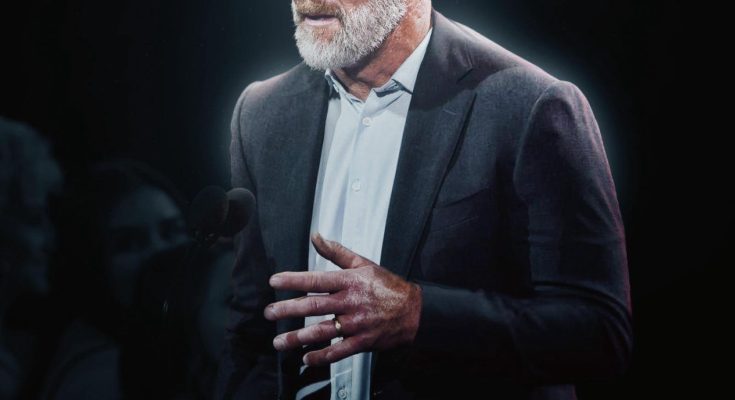Brett Favre, the once invincible quarterback whose gunslinger spirit captured the hearts of football fans everywhere, today faces an altogether different kind of opponent—a relentless adversary that doesn’t respond to passes or playbooks. Brett Favre, now 55 years old, opened a vulnerable chapter recently on “The Sage Steele Show,” speaking candidly about his Parkinson’s diagnosis and how its symptoms are quietly but steadily sinking deeper into his life. He spoke with a raw honesty that many of us who watched his legendary career can’t help but feel deeply alongside.
It was during a congressional hearing last September that he first revealed his Parkinson’s diagnosis publicly. He’d kept it private for a time, but his health was too serious—and the moment too significant—to remain unspoken any longer. The disease, as he told lawmakers, was something he had waited too long to confront, and now, the clock was moving whether he liked it or not.
On Sage Steele’s podcast, Favre described how his symptoms have evolved—how the tremors many associate with Parkinson’s aren’t the worst of it for him. Instead, stiffness took a cruel leading role. “Everyone attributes Parkinson’s with shaking… I have a little shaking, but not like Muhammad Ali or Michael J. Fox,” he said . What plagues him most is rigidity. His body, especially on the right side, has begun to feel like unbending wood. He described it with vivid imagery: “I feel like a pretzel… Everything is so rigid. I take the medicine and 20 minutes later, at least in my mind, it’s like a total new body”
That rigidity has now crept into one of the most fundamental acts of life: swallowing. Favre revealed, “I have a hard time swallowing. One of the doctors, out of the blue, said, ‘How’s your swallowing?’ … There are times where I think I’m choking. So it’s sort of scary because they can’t fix that” It’s a chilling detail, one that hits on two levels—physical danger from choking, and deeper still, the fear that his body is turning against him in ways he cannot yet control.
He admitted that some nights, when everything is quiet and he can “decompress,” the full weight of it becomes overwhelming. It’s at those vulnerable moments that he feels the unmistakable creeping sense that he is progressing, that Parkinson’s is slowly claiming more ground It’s an experience that is profoundly lonely in its intensity, even for a man who has never walked away from a fight.
Despite the gravity of it all, Favre’s framing of his condition remains grounded in determination. “I try not to think about it. I try to just focus on getting after the day,” he said. In moments of clarity and clarity alone, he fights—on his own terms
Parkinson’s disease itself is a cruel thief. A disorder of the central nervous system, it stems from the degeneration of dopamine-producing cells in the brain—a slow erasure of the mechanisms that enable smooth movement, nuanced speech, steady gait. Tremors, stiffness, slow motion, balance loss—these are the familiar hallmarks of the condition, but there’s also a deeply human collateral damage: emotional lability, speech difficulties, swallowing issues, urinary challenges, constipation, skin changes—sometimes even hallucinations or depression
In Brett’s case, head trauma is part of the story. He estimates he endured thousands of concussions over his 20-season NFL career—a statistic that underscores the brutality of the game and raises alarming questions about long‑term neurological risk CNBC). Studies have connected repeated head trauma with increased Parkinson’s risk—some showing organized tackle football players nearly three times as likely to develop Parkinsonism as others For Favre, the question isn’t rhetorical—it’s personal.
Yet, even in the absence of a cure, there are ways to fight back, however modestly. Medications like levodopa and its combinations can boost dopamine levels and help control symptoms, at least for a while. Physical activity, speech therapy, and other supportive strategies can strengthen the body that Parkinson’s would weaken And for some, surgical interventions like deep brain stimulation offer substantial relief. In February 2025, the FDA approved Medtronic’s BrainSense Adaptive deep brain stimulator—a device that senses abnormal brain signals and responds in real time, delivering tailored stimulation to quell symptoms (TIME). It’s not a cure, but it is a step forward in managing the disorder with precision.
Cutting-edge research is also opening new frontiers. Studies are exploring intelligent dopamine modulators that could deliver neurotransmitters precisely where needed; AI‑based tools are improving early detection and symptom monitoring; even adapted exercise programs like Rock Steady Boxing show promise for preserving motor and emotional function (arXiv). These aren’t immediate solutions for Brett, necessarily, but each represents human ingenuity pushing back against an otherwise intractable decline.
Through it all, what strikes me most in Favre’s story is the emotional landscape: the fear of choking, the confusion over rigidity, the ruthless progression—moments when a public hero is stripped down into someone trying simply to breathe, to swallow, to live like a person. There’s grief in his words—not rage, not surrender, but quiet sorrow and survival.
He talks about decompression moments, of thinking, perhaps for the first time in his life, “I’m progressing a little bit.” That realization, tones of inevitability fused with fear—it’s anything but “normal.” And yet he doesn’t collapse under it. He fights. He keeps going. He finds the new “normal.”
We all loved Brett Favre for his grit, his passion, his refusal to quit. Maybe the greatest lesson from his Parkinson’s journey is seeing that same heart applied to an entirely different kind of battle—one without snap counts, without fans, without touchdowns. Here, the scoreboard is whereabouts of dopamine in the brain, the reliability of throat muscles, the calmness of sleeping thoughts. It doesn’t make it any easier—but he faces it with the same resolve that once made him a legend.
Parkinson’s may steal stiffness and swallow, it may steal control. It may sideline talents and dreams. But it does not necessarily steal spirit. And Brett Favre’s voice on that podcast is proof enough. He’s still standing. He’s still fighting. And that—perhaps—is the truest legacy any athlete could hope for.



